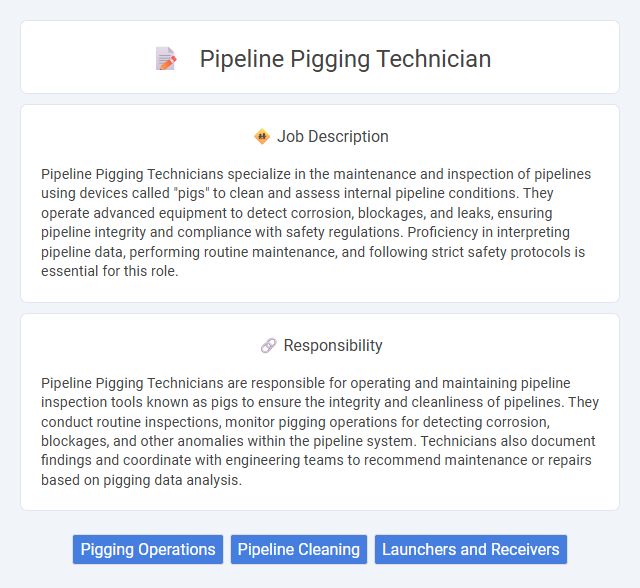
Pipeline Pigging Technicians specialize in the maintenance and inspection of pipelines using devices called "pigs" to clean and assess internal pipeline conditions. They operate advanced equipment to detect corrosion, blockages, and leaks, ensuring pipeline integrity and compliance with safety regulations. Proficiency in interpreting pipeline data, performing routine maintenance, and following strict safety protocols is essential for this role.
Individuals with strong physical endurance and the ability to work in confined spaces are likely to suit the role of a Pipeline Pigging Technician. Those comfortable with rigorous safety protocols and adaptable to varied weather conditions may find this job fitting. People who prefer routine desk jobs or have restrictions on physical activity might not thrive in this position.
Qualification
Pipeline Pigging Technicians require specialized skills in operating and maintaining pipeline inspection tools known as pigs to ensure pipeline integrity. Qualifications typically include a high school diploma or equivalent, supplemented by vocational training or certification in pipeline technology, safety protocols, and mechanical systems. Experience with hydraulic systems, knowledge of pipeline specifications, and proficiency in using diagnostic equipment are essential for effective performance in this role.
Responsibility
Pipeline Pigging Technicians are responsible for operating and maintaining pipeline inspection tools known as pigs to ensure the integrity and cleanliness of pipelines. They conduct routine inspections, monitor pigging operations for detecting corrosion, blockages, and other anomalies within the pipeline system. Technicians also document findings and coordinate with engineering teams to recommend maintenance or repairs based on pigging data analysis.
Benefit
Pipeline pigging technicians likely experience significant safety benefits as pigging processes help prevent pipeline failures and leaks. The role may offer competitive compensation and opportunities for specialized technical skill development. There is a strong probability of job stability due to consistent demand for pipeline maintenance in energy industries.
Challenge
Working as a Pipeline Pigging Technician likely involves navigating complex operational challenges due to the technical demands of maintaining pipeline integrity and ensuring safe flow. The role probably requires problem-solving skills to address unexpected blockages or equipment malfunctions while maintaining adherence to safety and environmental standards. Facing such dynamic obstacles may demand continuous learning and adaptability in various field conditions.
Career Advancement
Pipeline Pigging Technicians play a critical role in maintaining pipeline integrity by operating and managing pipeline cleaning and inspection tools known as pigs. Mastery in advanced pigging technologies and safety protocols can lead to specialized roles such as Pigging Supervisor or Pipeline Integrity Specialist. Continuous skill development and certifications in pipeline management significantly enhance career advancement opportunities within the oil and gas industry.
Key Terms
Pigging Operations
Pipeline Pigging Technicians specialize in executing pigging operations to maintain pipeline integrity by cleaning, inspecting, and monitoring internal pipeline conditions. They operate and manage various types of pipeline pigs, including cleaning, gauging, and intelligent pigs, ensuring efficient flow and detecting corrosion or blockages. Expertise in pipeline systems, safety protocols, and data analysis from intelligent pigging devices is essential for optimizing pipeline performance and preventing failures.
Pipeline Cleaning
Pipeline Pigging Technicians specialize in cleaning and maintaining pipelines using mechanical devices known as pigs. These professionals ensure the removal of debris, buildup, and corrosion to optimize flow efficiency and prevent blockages. Expertise in operating and monitoring pipeline pigs directly contributes to pipeline integrity and safety in oil and gas systems.
Launchers and Receivers
Pipeline Pigging Technicians specialize in the operation and maintenance of launchers and receivers, critical components used to insert and retrieve pipeline inspection gauges (pigs). They ensure the safe and efficient pigging process by monitoring pressure, performing equipment inspections, and troubleshooting issues related to pig launching and receiving. Expertise in handling various pig types and maintaining pipeline integrity during launching and receiving phases is essential for preventing downtime and enhancing pipeline performance.
 kuljobs.com
kuljobs.com